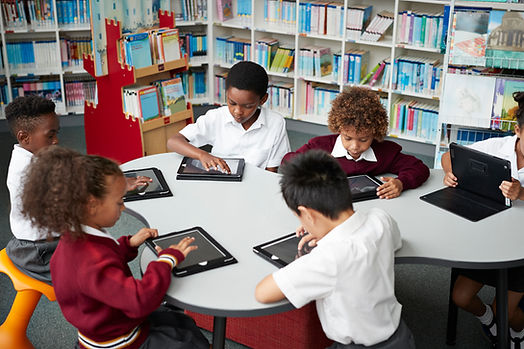
Who We Serve...
We serve children of color, primarily between the ages of 6 and 13, in underserved communities across the country. Our focus is on providing financial literacy education to help them make informed financial decisions and build a brighter future.
Here's why this is so crucial...

The Literacy Landscape
General Literacy Statistics
According to the National Center for Education Statistics, 65% of fourth graders in the United States are not proficient in reading, and this percentage is higher among children of color .
Literacy Among Children

Black Fourth Graders:
Only 18% perform at or above proficient levels.
Hispanic Fourth Graders:
Only 23% perform at or above proficient levels.
White Fourth Graders:
46% perform at or above proficient levels.
The National Assessment of Educational Progress (NAEP) shows that only 18% of Black fourth graders and 23% of Hispanic fourth graders perform at or above proficient levels in reading, compared to 46% of their white peers.
Financial Literacy Statistics
The Financial Industry Regulatory Authority (FINRA) reports that only 28% of Black adults and 34% of Hispanic adults demonstrate basic financial literacy, compared to 48% of white adults.
Financial Literacy Among Adults

Black Adults:
Only 28% demonstrate basic financial literacy.
Hispanic Adults:
Only 34% demonstrate basic financial literacy.
Black Adults:
Only 48% demonstrate basic financial literacy.
Financial Literacy Test Among Adults

Black Adults:
Correctly answered 38% of questions.
Hispanic Adults:
Correctly answered 41% of questions.
Black Adults:
Correctly answered 55% of questions.
A study by the TIAA Institute reveals that Black and Hispanic individuals correctly answered only 38% and 41% of financial literacy questions, respectively, compared to 55% for white individuals .

Marginalization and Disadvantage
Economic Disadvantages
-
The median wealth of white households is ten times greater than that of Black households and eight times greater than that of Hispanic households, according to the Brookings Institution.
-
This wealth gap is partly due to historical and systemic inequalities that have limited access to financial education and resources for communities of color.
Impact on Children
-
Children of color are more likely to grow up in low-income households, where financial instability is prevalent. According to the Annie E. Casey Foundation, 33% of Black children and 27% of Hispanic children live in poverty, compared to 11% of white children
-
The lack of financial literacy education further perpetuates this cycle of poverty, leaving these children unprepared to make informed financial decisions as adults.

Why we serve...
Closing the Gap
By providing financial literacy education, we aim to close the racial wealth gap and promote economic mobility.
Breaking the Cycle
We strongly believe that early financial education can help break the cycle of poverty by equipping children with the skills they need to achieve financial stability and success.
Creating Opportunity
Our cause is predicated on the belief that financial literacy empowers children to make informed decisions, pursue higher education, and build a brighter future for themselves and their communities.
Our Approach to Lasting Impact

Innovative Programs
-
Wealth Wise Kids Project: Our flagship initiative develops and distributes engaging, culturally relevant children's books that teach essential financial literacy concepts.
-
Marvel’s Money Masters Academy: One of our more popular programs designed to teach business skills and financial planning to young entrepreneurs.
Community Engagement
-
Storytime Sessions: We have partnered with local and national sponsors to help provide interactive sessions where children and parents can enjoy financial literacy books and engage in activities that reinforce learning.
-
Parent and Child Workshops: Our workshops are designed to educate families together, fostering a community-wide understanding of financial literacy.
Measuring Impact
-
Assessments and Surveys: We conduct pre- and post-program assessments to measure improvements in financial knowledge and behaviors.
-
Feedback and Improvement: Collecting feedback from children, parents, and educators to continuously enhance our programs.

Here are the results we already have...
30+ Communities served..
Through our programs, we have reached over 30+ communities, distributing thousands of books and educational materials. Our impact assessments show significant improvements in financial knowledge and behaviors among participating children.


Spotlight Distinctive
Highlighting standout stories and achievements from our programs, showcasing the positive impact on individual lives and communities.

Partnerships
We collaborate with schools, community centers, libraries, and other organizations to expand our reach and amplify our impact. Our partners play a crucial role in helping us deliver financial literacy education to those who need it most
Join Us in Making a Difference!
By supporting The Carter & Olay Foundation, you help us provide critical financial literacy education to children of color, empowering them to break the cycle of poverty and build a brighter future.
Together, we can bridge the racial wealth gap and create lasting change.

